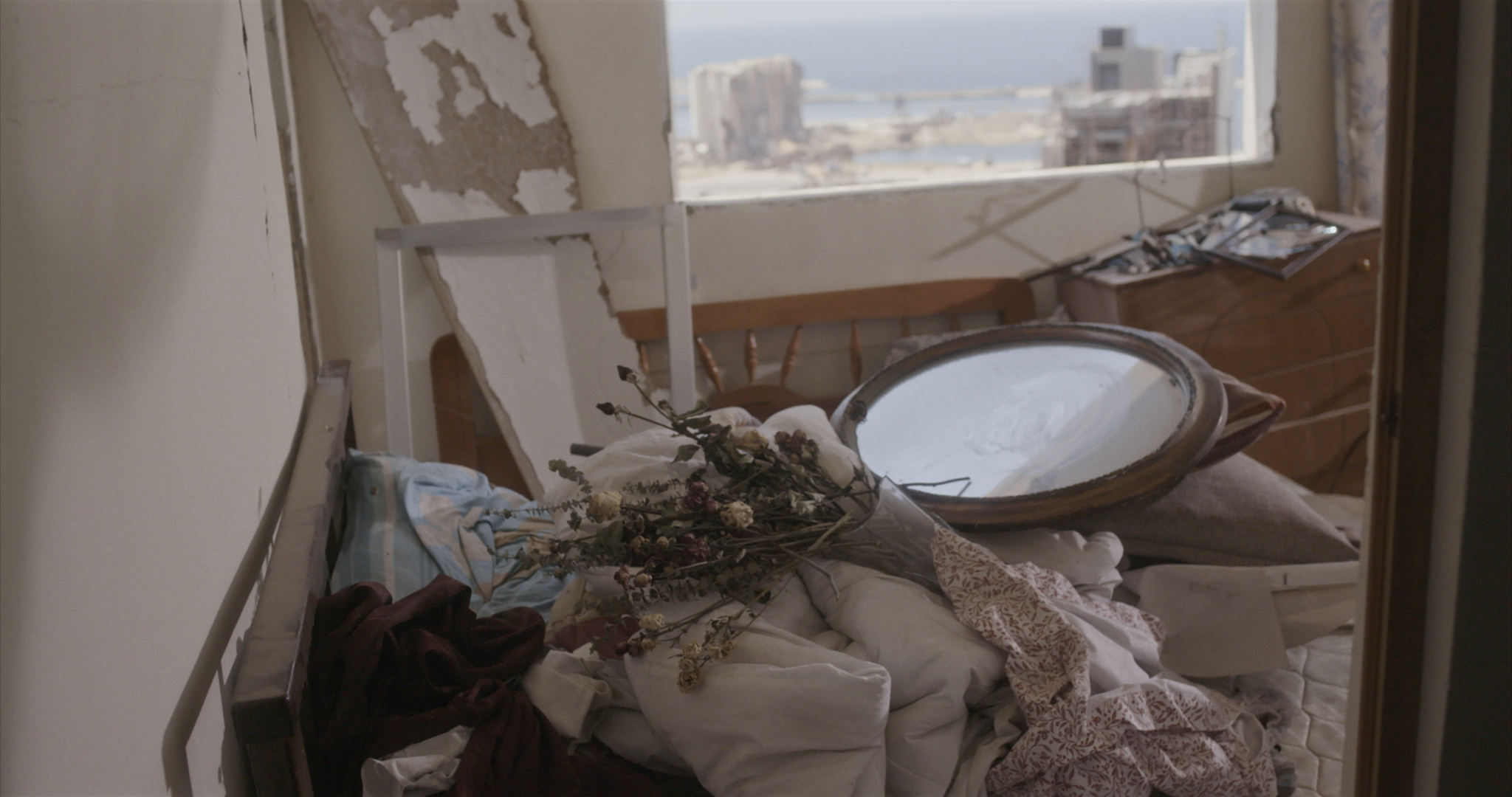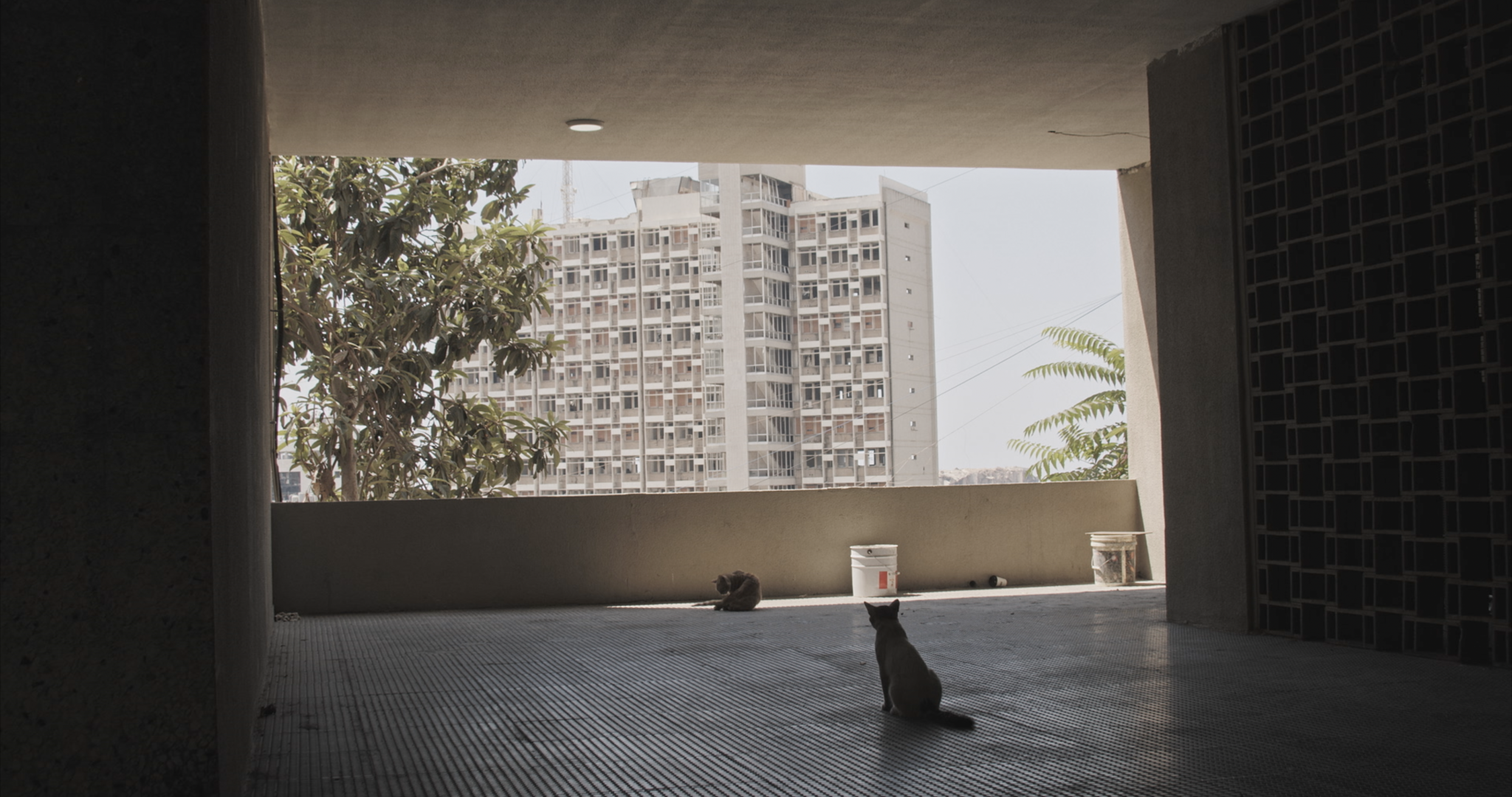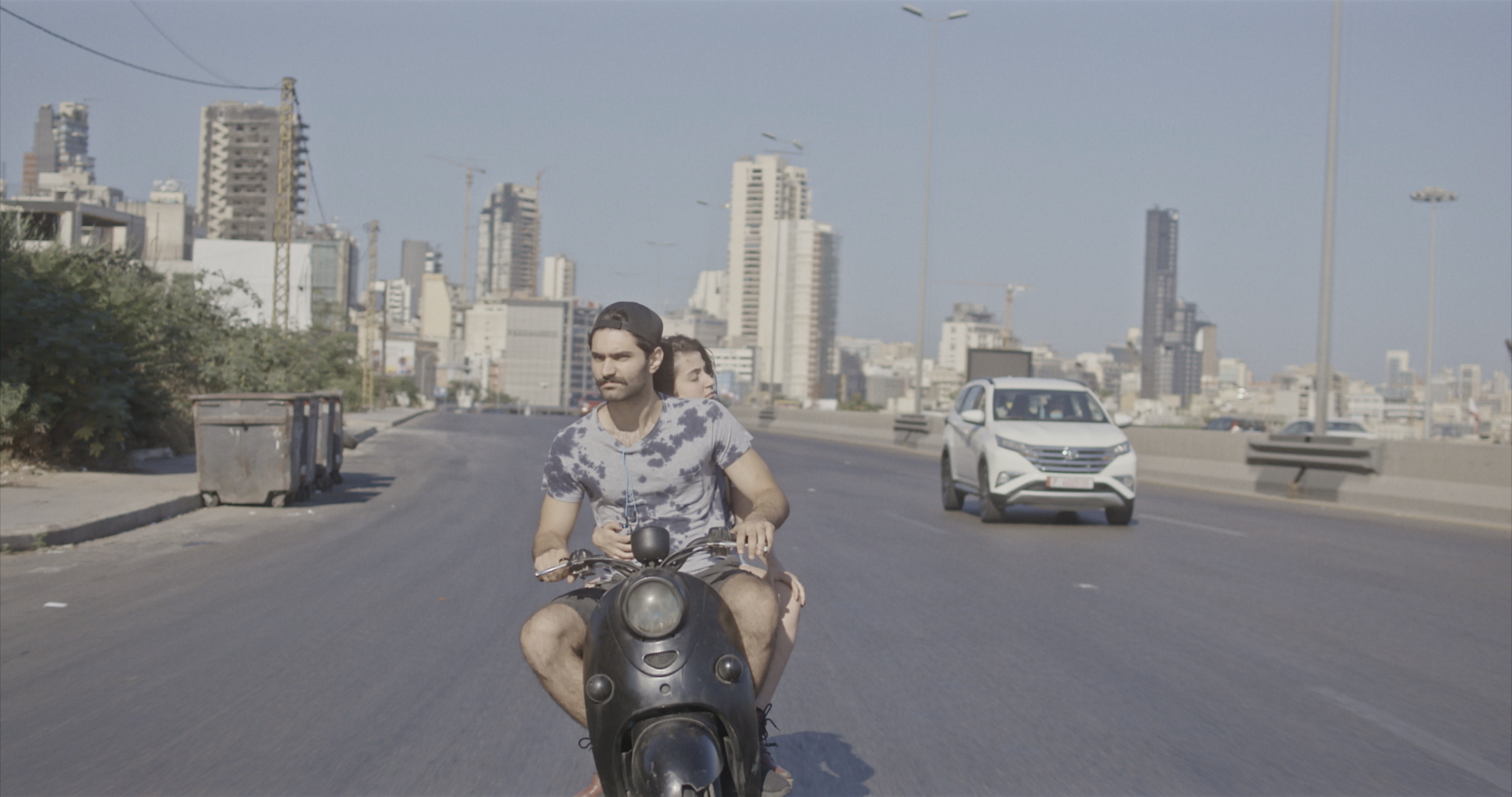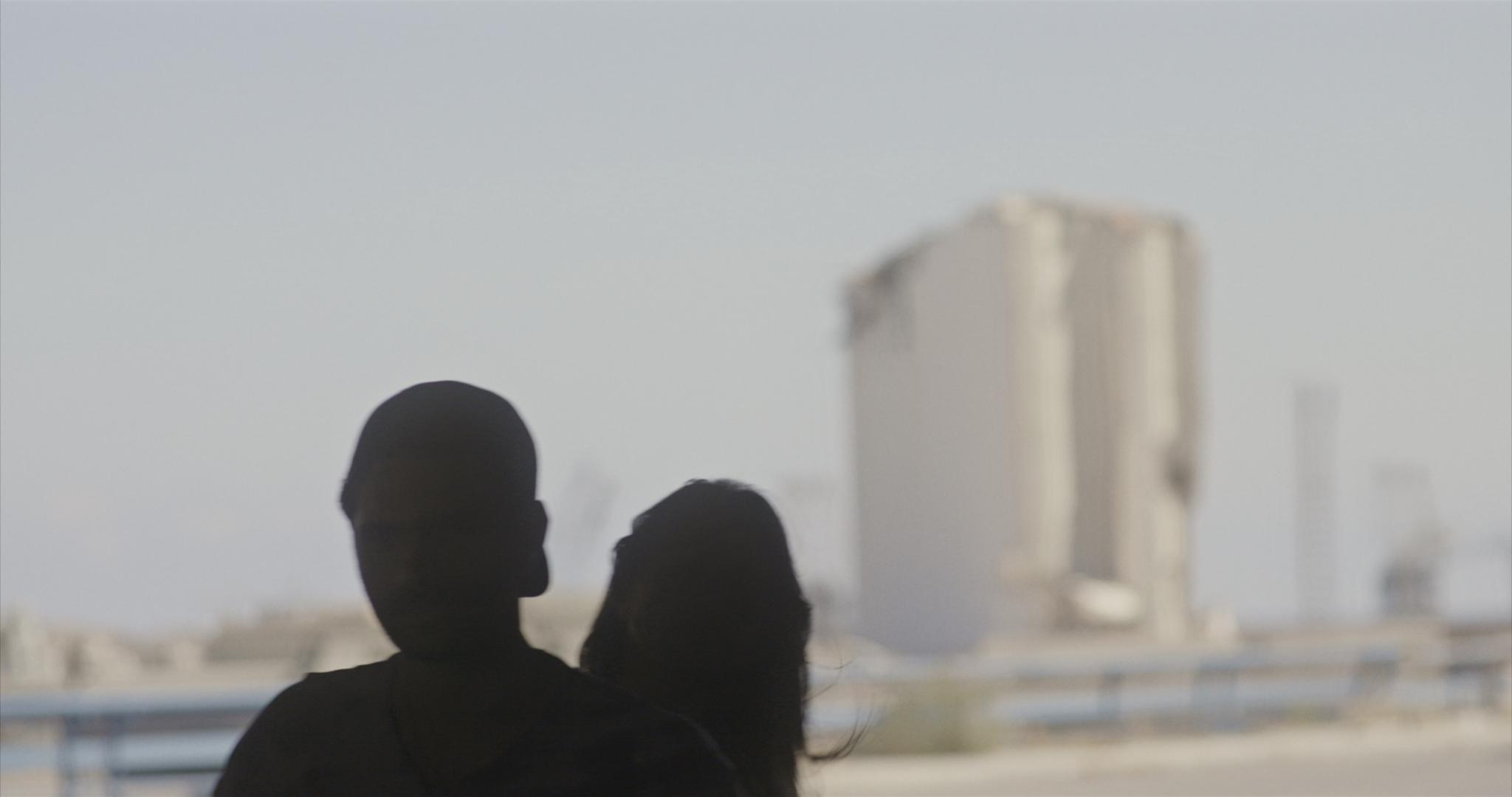

The Lebanese filmmaker sat down with A Rabbit’s Foot to discuss coming-of-age in Lebanon, how different traumas breed different perspectives, and The Sun Sets on Beirut, which remains as urgent a film as you could hope to come across this year.
You can trace a person’s history through the movies they make. Their memories, their obsessions, their regrets, their traumas—they pulse through the frames like red blood cells travelling around the body. For a filmmaker like Daniela Stephan, who has to date only released a couple of shorts (though she’s gearing up to shoot her first feature), the thematics at the heart of her cinema remain both complex and clear as day. “I don’t remember having a childhood.” She tells me, between casual bites of Mankouche (a type of Lebanese flat bread prepared that morning by our mutual friend, A Rabbit’s Foot’s own Adriana Aoun). “I grew up very quickly.” A child of divorce growing up in Beirut, it only makes sense, then, that Stephan’s output as a director thus far has focused on reconstructing the youth that was lost to her. After all, for someone who doesn’t remember their childhood, why not craft one yourself?
Her first short, Mummy Blue (2020), hits like an act of self-therapy, imagining an intimate conversation about generational trauma between a mother and a teenage daughter, with the latter all the while navigating the first confusing pangs of young love and sexuality. Her second, The Sun Sets on Beirut (2021), is an even more ambitious coming-of-age story, with Stephan upping the ante by turning her lens towards the 2020 Beirut port explosion that levelled the city, caused hundreds of casualties, thousands of injuries, and left hundreds of thousands homeless. The film follows friends Mounia (Marilyne Naaman) and Ghady (Pio Chahine) as they journey through Beirut in search for the former’s cat, who went missing during the explosion. Travelling deeper into the ruins of the city, the two navigate their differing perspectives and emotions on the tragedy.
Despite being shot a few years ago now, it’s a film that keeps finding new life—this time in the wake of Israel’s most recent assault on Lebanon over the past several months, a development that feels intrinsic to Stephan’s perspective on the cyclical nature of Lebanese tragedy and trauma. “The Sun Sets on Beirut is set in the backdrop of the post-fourth of August explosion” She explains. “But it’s about more than just a singular tragedy, it’s about history repeating itself over and over again.”
Here, Stephan discusses coming-of-age in Lebanon, how different traumas breed different perspectives, and The Sun Sets on Beirut, which remains as urgent a film as you could hope to come across this year.

A still from The Sun Sets on Beirut (dir. Daniela Stephan).
LG: Were you a cinephile growing up?
DS: I wasn’t necessarily a cinephile as a kid. My dream at the time was to become a war photographer. But I used to watch films in hiding. I used to secretly watch French films, which often would be full of sex and drugs. I watched Christiane F when I was 13. [laughs]. I would steal the DVD’s and watch them on sick days, which was all the time, because I hated school and would fake being sick often.
LG: How does watching a film like that affect an early teen?
DS: Watching Christiane F. was a pivotal moment for me; it made me realize the profound impact cinema can have in reflecting society. When I told my mom later on that I watched the film at 13, she smiled and she told me that my grandfather gifted it to her thinking it was a children’s film. She was 13, and she also ended up watching this really traumatic, harsh film at that age. That stuck with me—it felt like intergenerational trauma, which I explore a lot in my films. She had the same experience as me, so many years earlier, we had just never opened up to each other about it.
LG: Were you mature beyond your years as a child?
DS: I think so, yes. I don’t remember having a childhood. many of us didn’t have enough space to grow up happy with ourselves. I grew up very quickly. My parents got divorced quite young, and so I was always very conscious of the very adult politics and relations in the family. I remember being very conscious of the world around me. I don’t remember myself as a child, the earliest I can remember is as a teenager already trying to discover myself. That’s why most of my stories are coming of age. The act of maturation, the act of discovering yourself and your sexuality, the society you live in and how that society divides you: who’s “the other” that you, supposedly, shouldn’t be talking to.
LG: That’s an admirable and ambitious subject to tackle for a first feature.
DS: My grandma taught me to think from many perspectives. She grew up in West Beirut, a Christian among a community of predominantly Muslims. She’s very vocal about the rights of Palestinians to be free in their land. My mom is from Damour, a village in Lebanon that experienced one of the biggest massacres by a Palestinianian militia. You see the difference between generations, and how differently the relationships to our neighbours can be based on past and inherited traumas. That is going to be the subject of my first feature.
LG: There’s a moment in The Sun Sets on Beirut that speaks to what you’re saying, in which two characters argue their perspectives on this explosion that’s happened in Beirut. I’ve spoken to many Lebanese people about their perspectives on the current conflict, and I haven’t heard one same opinion between them.
DS: We don’t have unified history books that tell us exactly what happened, so everyone has their own very singular encounter with Lebanese history. The Civil War—what happened? What went wrong? We don’t study it, so we don’t know. And if we don’t know what went wrong then history will repeat itself. The Sun Sets on Beirut is set in the backdrop of the post-fourth of August explosion, but it’s about more than just a singular tragedy, it’s about history repeating itself over and over again.

A still from The Sun Sets on Beirut (dir. Daniela Stephan).
LG: If you were to make this film now, would it look different?
DS: I’m not the same person as I was three years ago. I’m even angrier now. But the thematics are the same. We don’t speak about the port explosion as one event, but as part of a greater cycle of trauma and tragedy being inflicted by political parties that have stolen from and bombed us. The two lead characters in the film have very different political opinions, but are still best friends because they haven’t come of age yet, they haven’t gone into this adult world in Lebanon where the division is more aggressive. As a teenager in Lebanon, all you want is to survive tragedies. The characters are trying to make sense of the world they’re living in. I’ve been looking over my shoulder my whole life—it’s second nature to us to send our parents our location when we go out in case there is a bombing. We’ve inherited their anxieties. We live inside a ticking bomb, and our parents were always aware that everything can be fine one moment and slip out of control in a heartbeat. The port explosion was beyond words. My window shattered all over my bed—if I had had my earphones in, lying on my bed, unaware of my surroundings, I would have died. And we were the lucky ones.
LG: You flesh out the setting really well in the film, where you have this massive traumatic event as the backdrop to a very intimate story of our protagonist’s cat being lost.
DS: Initially I wanted to make another film completely. I had my script ready and was going to shoot it. Then, two days before coming back to Beirut from London, the explosion happened, and my cat disappeared from the house. I looked at this film I had been working on for six months, and in the light of this tragedy, I didn’t care anymore about what I had written. It didn’t feel right anymore—my world had suddenly, irreversibly, changed.
I went to Beirut and looked everywhere for her. We found her 3 days later after the explosion in my house, almost completely destroyed, hiding herself away out of shock. For months I wasn’t writing or even thinking of making a film. Then 6 months later, I decided to use the story of the missing cat as a metaphor for what the people in Lebanon have lost. These cats that roam the streets, not having one place to go…I used to look at these cats, bruised and patchy, missing eyes and limbs, limping along…
But Beirut is very much at the core of everything in the film. It’s a city that I’m in love with and that has gone through so much. I wanted the city’s voice to come through strongly in the film, expressed through the writings on the walls. I wanted Beirut to be screaming silently, a city that reflects our anger.
LG: She doesn’t find the cat in the movie, though. She finds a cat stuck in the exhaust pipe, but it’s not her cat, right?
DS: No, it’s not. That really happened to my sister while I was writing the film. She called me crying because she found a kitten trapped in a car exhaust pipe, and she tried to tell the owner, who completely ignored her, turned on the car and left. But it’s this hyperfocusing on something because you want to feel in control. “if only I could just save this one cat.” The tragedies we experience are so invasive in that way, you feel robbed of something, so a moment of control feels valuable. To this day, I don’t feel comfortable sleeping next to my window, like many people in Beirut.
LG: There’s a Western student journalist in the movie who asks to interview Mounia about the tragedy, to which Mounia indicates her frustration at the romanticisation of the Lebanese struggle by the Western world. Do you find that’s applicable to the conflict going on in the past few months?
DS: When the 4th of August happened there were a lot of foreigners in Beirut, and I felt anger towards them for suddenly taking this interest in our lives and situations. It felt like they were only interested in our tragedy. On the other hand, at the end of the film she does give an interview to that journalist. It’s a double-edged sword. There’s an element of exploitation, yes, but they’re also trying to get our voices heard. When the recent war happened, I was pleasantly surprised by how many Westerners have stood up and joined us in protest. A lot of them genuinely want to understand more about the root of the conflict. I haven’t experienced that before this war.

A still from The Sun Sets on Beirut (dir. Daniela Stephan).
LG: What movies inspired how you approached filming?
DS: I was inspired by the Dogme 95 movement. I filmed The Sun Sets on Beirut with a documentary camera. I didn’t want to film it with an expensive Alexa—It would have felt misguided to come with a big budget camera and capture these overly picturesque shots. It wasn’t about the beauty of the shot as much as it was about the narrative. I didn’t care whether the shot was one centimeter to the left or right. It was important to have focus on what’s going on in the movie. I’m also inspired by Arab women filmmakers like Mai Masri and Jocelyne Saab, and the beautiful political music of Michelle and Noel Keserwany. Their work truly pushes boundaries, which is something I aim to achieve in my own work.
LG: Why not make it a documentary?
DS: For a documentary, there’s a sense that you have to remove yourself from the action. I couldn’t relive that moment in time as a documentary. I wanted everyone to approach it as fiction, but to infuse their own emotions into the characters and story. My two lead actors both lived through the explosion, and so we’re all tapping into that.
LG: At the end of the movie, Ghady describes the Lebanese people’s resilience. I understood that as a hopeful moment, but what you’ve just said leads me to believe that perhaps that might not be the most productive line of thinking for you.
DS: The “we are fighters” comment is more about him stressing the common ground between them. It’s not about an individual. It’s about us. We’re both hurting. You have different opinions and so do I, but we’re both experiencing the tragedies of this country all the same. After the 4th of August, if you saw the street it was only young people trying to help. We all got organised and took the responsibility of the state in our hands. There were policemen standing on the side eating shawarma, watching us work [laughs]. But one thing is clear to me: it was the community itself that truly cared about rebuilding Beirut. Politicians are business people, they don’t love this country like the people do. I hate politicians, I can’t love them. They did not love me.
LG: I noticed the Western journalist is wearing a Covid mask.
DS: When this happened, it was during Corona, and most of the Western countries were in lockdown. Us? We had so much more on our minds at that moment. But she removes the mask to talk to Mounia and doesn’t put it back on for the rest of the movie. I want to make it explicit that I’m not trying to demonise Westerners. I recognise that they have their own experiences. But the young people in Lebanon were angry, and sometimes that anger gets directed at the wrong people.
LG: Is Mounia’s character a mouthpiece for you?
DS: When I wrote it, I thought of her not as a mouthpiece for a generation, but I thought she might be like me, and some other young people, who are caught in this orbit of leaving and staying in Lebanon. A lot of people experience that. Are you going to stay and try and break the cycle of tragedy in your country, because your country needs you, or are you going to leave to make a life out of yourself, and not allow yourself to be tied to a whole country’s trauma? A lot of us ask ourselves this country. We’re very attached to our country. We’re very rooted people.
LG: But there’s that yearning to give yourself permission to be selfish?
DS: Exactly. But leaving the people who can’t leave…you feel like you’re doing this for everyone. I have a childhood best friend who has never had the opportunity to travel. He has only ever known Lebanon. I wonder if he had the opportunity to leave, if he would. Maybe it’s selfish for me to stay when I have the opportunity to leave.
LG: What do they think of those, like you, who have left Lebanon to study or work?
DS: Sometimes they dismiss our pain. Some people think that we only come back during the Summer, we have fun, and leave and forget about everything going on back home. That, of course, isn’t true, but it gives you a lot of survivor’s guilt. But right now, I only want to make my movies in Lebanon, in Beirut. It’s where I feel like my voice belongs. Lebanese cinema needs our voices.
LG: That shows you haven’t made a selfish choice by coming here to London.
DS: In Lebanon, I’m in survival mode. How can you create if you’re only focused on surviving? I didn’t truly process the 4th August until the 6th October, when I returned to London. At the same time, during those two months in Lebanon, I never felt closer to my friends and family. There was a lot of laughter, still. Lebanon is a beautiful place, despite all the tragedies. It’s a place of community, and I wanted my film to reflect that.
LG: What did making this film offer you on a personal level?
DS: Because history hasn’t been written in a unified way in Lebanon, all Lebanese movies re-write history from a personal level, from a humanistic point-of-view, not necessarily a political one. Lebanese cinema is proof of our existence. To make Lebanese films is a statement in itself. Our world is unexpected, we don’t know what we’ll wake up to, we don’t know who we’re going to lose, we don’t know what the future holds for us, but our cinema is proof that we won’t be silenced by our harsh reality.





